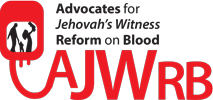1. W hat is AJWRB?
hat is AJWRB?
AJWRB stands for Advocates for Jehovah’s Witness Reform on Blood. It’s a group founded by current and former Jehovah’s Witnesses—including elders and medical professionals—who advocate for reform of the Watchtower Society’s blood transfusion policy. AJWRB promotes informed, voluntary decisions without coercion or fear of spiritual punishment.
2. Is AJWRB affiliated with the Watchtower Society?
No. AJWRB is independent from the Watchtower Bible and Tract Society (WBTS). It was formed as a response to concerns about the medical and ethical implications of the Watchtower’s blood policy.
3. What changes does AJWRB support?
AJWRB promotes:
- Medical freedom of conscience for Jehovah’s Witnesses
- Transparency about blood policy inconsistencies
- No disfellowshipping/disassociation (mandated shunning) for personal medical decisions
- Informed consent based on accurate, balanced information
4. Who started AJWRB?
AJWRB was launched in the late 1990s by reform-minded Jehovah’s Witnesses. The first public representative used the name “Lee Elder” to protect his identity from organizational reprisals.
5. Is AJWRB against Jehovah’s Witnesses?
Not at all. AJWRB supports Jehovah’s Witnesses as individuals. Its critique is limited to one policy—the blood transfusion doctrine—and its effects on informed consent, family life, and personal freedom.
6. Does AJWRB promote blood transfusions?
AJWRB does not tell Jehovah’s Witnesses to accept or refuse transfusions. It supports the right of every person to make truly informed, voluntary medical decisions without fear of spiritual punishment.
7. What’s available on AJWRB.org?
The site includes:
- Analysis of blood doctrine and medical ethics
- Real-life case studies
- Information for healthcare professionals
- Support for Jehovah’s Witnesses questioning the blood policy
8. Does AJWRB try to make JWs leave the religion?
No. AJWRB’s sole focus is on reforming blood policy and promoting free and informed choice. While some members do eventually leave, AJWRB does not campaign for people to exit the faith.
9. How can I contact AJWRB privately?
Use the encrypted contact form at https://www.ajwrb.org/contact. All communication is confidential and secure.
10. Is it “apostate” to visit AJWRB.org?
The Watchtower discourages visiting “apostate” websites, but AJWRB believes it is your ethical right to seek accurate information, especially when facing life-or-death decisions.
11. Has AJWRB made an impact?
Yes. AJWRB has:
- Empowered JWs with a clearer understanding of their options
- Helped clinicians navigate religious refusals
- Contributed to bioethics research and dialogue
- Potentially saved lives through better-informed decisions
12. How can AJWRB help doctors?
AJWRB provides:
- Guidance on Watchtower blood policy
- Tools to assess patient autonomy and coercion
- Best practices for trauma-informed care and private consultation
13. I have a Jehovah’s Witness family member who needs a blood transfusion. What should I say to them?
First, understand that your loved one is under immense emotional pressure—not just due to the medical emergency, but because of the threat of shunning. Jehovah’s Witnesses who accept prohibited blood products risk losing their entire social and family support system.
Try this compassionate approach:
- Lead with empathy: “I love you no matter what you decide. I just want you to have all the information and feel free to choose what’s right for you.”
- Speak privately if possible: Elders or Hospital Liaison Committee (HLC) members may be present, so find a moment where your loved one can talk without fear.
- Explore their understanding gently: “Did you know the Watchtower allows some blood fractions? Like albumin or Factor VIII?”
- Affirm their freedom of conscience: “I’m not here to tell you what to do—just to support you in making the decision that feels right in your heart, not one made out of fear.”
- Offer resources: Point them to AJWRB.org if they’re open to it, or offer to find a medical ethics liaison.
- Reassure them of your love: “Whatever happens, I’ll stand by you.”
If they’re unconscious or unable to speak, ask for an ethics consultation and consider whether previously signed refusals were made under pressure.
14. What can I do to help AJWRB?
AJWRB is a small, grassroots effort that relies on the support of people who care about informed consent, medical ethics, and human dignity. Here’s how you can help:
- Share the Website: Let others know about AJWRB.org—many have never heard of it.
- Educate Healthcare Professionals: If you’re in the medical field, share AJWRB resources with your colleagues and ethics teams.
- Contribute Personal Stories: Submit your experience (anonymously if needed) to help others understand the real-world impact of the policy.
- Advocate in Your Field: If you work in medicine, law, ethics, or psychology, promote awareness of religious coercion and consent issues.
- Offer Skills or Support: AJWRB occasionally needs technical, editorial, or legal help. Use their contact form to offer your expertise.
- Support Someone You Know: Be a kind, listening ear to someone who may be struggling with the blood doctrine.
- Stay Informed: Read and share AJWRB’s content. Awareness is the first step toward reform.


Recent Comments